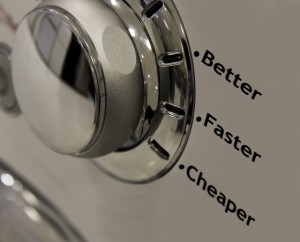All of you who e-mailed me in response to my last post — y’all are awesome, and thank you for your replies. Gah, I love the internets sometimes. It’s so ask-and-ye-shall-receive.
Anyway, so my longtime friend John told me a few weeks ago that this post I wrote a while back on how best to load your dishwasher changed his domestic life. John, I have another mind-blowing domestic post for you.
 Image: Gregory Szarkiewicz / FreeDigitalPhotos.net
Image: Gregory Szarkiewicz / FreeDigitalPhotos.net
I missed this when it first ran, but the New York Times’ Shortcuts column did a story a while back on how people tend to overdo it when adding laundry or dishwasher detergent to the respective appliance. Turns out, you could be doing your appliance harm and preventing your stuff from getting clean by oversudsing.
Newer models are made to use less detergent, and detergent is more concentrated these days anyway. So you’re almost certainly overdoing it. The appliance guru quoted in the story (how one gets to be an appliance guru, I have no idea, but they probably go to school with the Maytag repairman), says you can probably use an eighth to a half of what the detergent says to use in its directions, depending on how hard or soft your water is. High efficiency machines (front loaders) need high efficiency specific detergent, and don’t expect to see suds in the window. In fact, if you see suds during the wash, you’ve probably put too much soap in. When you oversoap, you waste money and could be shortening the life of what you’re washing.
You know how your glasses can sometimes come out of the dishwasher filmy and cloudy? Again, too much soap. You don’t have to fill up the detergent spot in the dishwasher — just follow the directions on the detergent package. The column says it’s good to rinse off large chunks of food — especially the ones that are baked on pretty good — but don’t go crazy prerinsing. You’re wasting water, and the water and soap need something to work against to be especially effective.
The column also had its own dishwasher-loading etiquette tips: Load large items at the edges so they don’t block water and soap from reaching the other dishes; place the dirty sides facing the center so they get maximum exposure to water and soap; and don’t load forks with forks and spoons with spoons to prevent the items from nesting together and not getting clean. But we knew that last one already, right John?
Read the whole column here for a few more appliance tips. Check out another installment of the Shortcuts column about how you can go way more miles before an oil change than Jiffy Lube wants you to believe.
Hey, thanks! I think I have been guilty of oversudsing, but now I have expert advice to follow so as to improve my domestic goddess status.
Holy crap I need to check this out because I think I’m a huge offender on this. You are awesome for pointing this out.